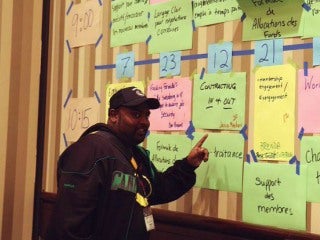
CUPE education workers share tactics to face common threats
Toronto, October 6 to 9, 2014
CUPE education workers met at the CUPE National Sector Council to share information and strategies for bargaining and mobilization.
Members from the education sector shared information on their bargaining structures. In some provinces members are bargaining under central models. In other provinces members have embraced the concept of provincial bargaining and are working towards it. Also, members in a few provinces have decided not to participate in central bargaining as of yet.
Mobilization strategies also differ across the country, partly as a result of legislation. In some provinces you must apply to the Ministry of Labour before you can even take a strike vote. In others you can be totally mobilized before even opening negotiations– a model several provinces are working toward.
Groups of members from across the country discussed a wide range of issues facing education workers including: the increase in part-time work with no benefits, funding formulas, the need for employer-supported skill development, contracting in and out, bullying and violence in the workplace, layoffs, the reduction of the number of days of work in the school year, membership engagement and disengagement, young workers’ issues, contract language, unpaid work, workload, strengthening of pensions, and the uneven playing field between support staff and teaching staff.
Workers are experiencing the same erosion of working conditions, the same cutbacks and the same pressures. At the small tables they shared bargaining and organizing strategies, contract language, and success stories. Some key examples included:
- Increasingly educational assistants (EAs) are being asked to do health care work. Some examples given were inserting catheters, feeding tubes, needles and deep suctioning. While some are classified to do this, most are not. Some EAs are courageously refusing to do the work, filing grievances and making this an issue at the bargaining table.
- Days of work being eliminated from school work year. British Columbia members negotiated language that prohibits elimination of days of work in their central contract and some BC locals recommend the provincial bargaining model to achieve this provision.
Defined benefit pensions are being eroded right across the country and there is constant pressure to move to defined contribution or shared risk models. One worker encouraged locals to “have a young worker on your pension committee so they understand from beginning of their career why it’s important to keep our plans defined benefit plans.”
Photo album: Education sector council meeting

